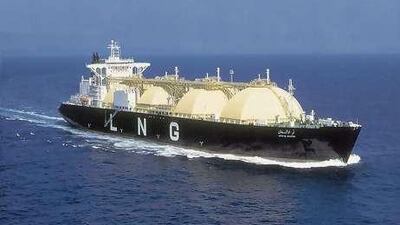Abu Dhabi has long-term plans to expand its gas exports, an independent study of the emirate's energy sector shows. The emirate's two big gas pro-jects, the Shah gas and "integrated gas" developments, "will go a long way to meet domestic needs and establish Abu Dhabi as a leading gas exporter through expansion of its gas terminals", said Gilles Valentin, the editorial director of The Oil and Gas Year Abu Dhabi 2010, released yesterday by Wildcat Publishing in the UK.
Mr Valentin's remarks, which followed months of interviews with senior industry executives by researchers working on the yearbook, provided some of the first indications of Abu Dhabi's plans for gas exploitation once its sole export contract expires in 2019. For the moment, he said, "Abu Dhabi needs all the gas it can get" for its domestic market, to fuel power and industrial plants and to boost oil production by reinjection into ageing fields. But that could change.
"There are a number of key gas projects all earmarked for increasing production," Mr Valentin said. "Some of this production will be making its way to the export terminals of Abu Dhabi. "There is no doubt that the gas will follow the same path as oil. There's a lot of gas. It shows the potential for further export is here." The yearbook estimated Abu Dhabi's gas reserves at 204.8 trillion cubic feet, slightly below the latest 227.1 trillion cu ft estimate for the UAE published by BP in its benchmark Statistical Review of World Energy.
The yearbook also estimates Abu Dhabi's oil reserves at 98.2 billion barrels, which is higher than BP's estimate of 97.8 billion barrels for the UAE. In an interview published in the yearbook, Fahim Kazim, the general manager of Abu Dhabi Gas Liquefaction Company (ADGAS), said there was a plan to partially decouple the unit's operations from that of its oil-producing sister enterprise Abu Dhabi Marine Operating Company ADMA-OPCO.
ADGAS is the subsidiary of Abu Dhabi National Oil Company (ADNOC) responsible for exporting most of the gas produced from Abu Dhabi's offshore oilfields in the form of liquefied natural gas (LNG). That would leave the gas exporter with more flexibility over its operations, which are based on Das Island off Abu Dhabi's coast. As of this year, ADGAS would no longer export all of ADMA-OPCO's gas output, but would instead send at least 200 million cubic feet per day (cfd) ashore through a new 117km pipeline from Das Island.
Another 1 billion cfd would be available for Abu Dhabi's domestic market from offshore and onshore fields starting in 2013, after the completion of the integrated gas development, Mr Kazim said. While he did not indicate any immediate plans to increase LNG exports, it is possible the integrated project could soon facilitate higher exports of gas liquids such as propane and butane. These are often sold in small cylinders suitable for fuelling household appliances such as ovens, stoves and barbecues.
The integrated project "will see the construction of a fourth natural gas liquids fractionation train at Ruwais and storage tanks for propane, butane and paraffinic naphtha for export", the yearbook stated in a summary of Abu Dhabi's gas projects. Propane, butane and other gas liquids are often stripped from the raw gas stream for separate sale, leaving mostly methane to be sold commercially as "natural gas".
LNG is essentially liquefied methane and is more difficult and energy-intensive to produce and transport than fuels marketed as "natural gas liquids" due to the extremely low temperature required. Khadem al Qubaisi, the chairman of Abu Dhabi's International Petroleum Investment Company (IPIC), told a yearbook researcher the sovereign wealth fund had about US$46 billion (Dh168.82bn) in assets, already exceeding its target of amassing a $40bn portfolio of international investments by 2013.
"Perhaps we have to recalibrate our growth targets," Mr al Qubaisi said in a published interview. "It should be remembered that 2009 saw great investments for both IPIC and Aabar Investments, as the financial crisis generated opportunities well outside market norms." Aabar is wholly owned by IPIC. The affiliates' investments last year included large stakes in the car maker Daimler. "Things have settled down and I expect a period of consolidation for both IPIC and Aabar as we integrate the investment of 2009 into our portfolio," Mr al Qubaisi said.
tcarlisle@thenational.ae

